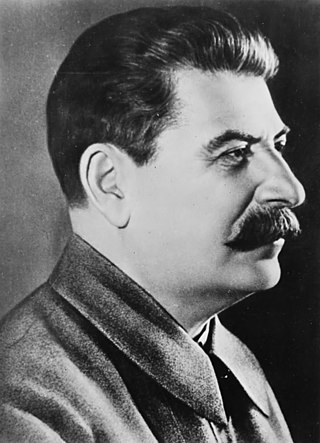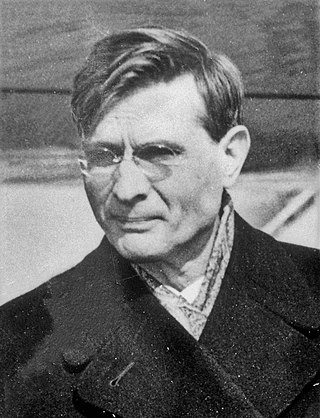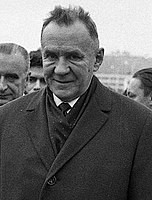
Leonid Ilyich Brezhnev was a Soviet politician who served as General Secretary of the Communist Party of the Soviet Union from 1964 until his death in 1982, and Chairman of the Presidium of the Supreme Soviet from 1960 to 1964 and again from 1977 to 1982. His 18-year term as General Secretary was second only to Joseph Stalin's in duration.

The general secretary of the Central Committee of the Communist Party of the Soviet Union was the leader of the Communist Party of the Soviet Union (CPSU). From 1924 until the country's dissolution in 1991, the officeholder was the recognized leader of the Soviet Union. Prior to Joseph Stalin's accession, the position was not viewed as an important role in Vladimir Lenin's government and previous occupants had been responsible for technical rather than political decisions.

Mikhail Andreyevich Suslov was a Soviet statesman during the Cold War. He served as Second Secretary of the Communist Party of the Soviet Union from 1965, and as unofficial chief ideologue of the party until his death in 1982. Suslov was responsible for party democracy and power separation within the Communist Party. His hardline attitude resisting change made him one of the foremost orthodox communist Soviet leaders.

Nikolai Viktorovich Podgorny was a Soviet statesman who served as the Chairman of the Presidium of the Supreme Soviet, the head of state of the Soviet Union, from 1965 to 1977.

Alexei Nikolayevich Kosygin was a Soviet statesman during the Cold War. He served as the Premier of the Soviet Union from 1964 to 1980 and was one of the most influential Soviet policymakers in the mid-1960s along with General Secretary Leonid Brezhnev.

The "Era of Stagnation" is a term coined by Mikhail Gorbachev in order to describe the negative way in which he viewed the economic, political, and social policies of the Soviet Union that began during the rule of Leonid Brezhnev (1964–1982) and continued under Yuri Andropov (1982–1984) and Konstantin Chernenko (1984–1985). It is sometimes called the "Brezhnevian Stagnation" in English.

The attack on Camp Holloway occurred during the early hours of February 7, 1965, in the early stages of the Vietnam War. Camp Holloway was a helicopter facility constructed by the United States Army near Pleiku in 1962. It was built to support the operations of Free World Military Forces in the Central Highlands of South Vietnam.

The Chairman of the Council of Ministers of the Soviet Union was the head of the government of the Soviet Union during the existence of the Council of Ministers of the Soviet Union from 1946 to 1991.

The Ministry of Justice of the Union of Soviet Socialist Republics (USSR), formed on 15 March 1946, was one of the most important government offices in the Soviet Union. It was formerly known as the People's Commissariat for Justice abbreviated as Наркомюст. The Ministry, at the All-Union (USSR-wide) level, was established in the 1936 Soviet Constitution, and was in turn based upon the People's Commissariat for Justice of the Russian Soviet Federative Socialist Republic (RSFSR) formed in 1917, with the latter becoming subordinate, along with the other republican Narkomyusts, to the Union-level People's Commissariat of Justice of the USSR. The Ministry was led by the Minister of Justice, prior to 1946 a Commissar, who was nominated by the Chairman of the Council of Ministers and confirmed by the Presidium of the Supreme Soviet, and was a member of the Council of Ministers.

Alexei Kosygin's second government lasted four years, until the 1970 Soviet election held on 14 June. Many new ministries were created under it.

The former government of Alexei Kosygin was dissolved following the Soviet legislative election of 1970. Kosygin was once again elected Premier by the Politburo and the Central Committee following the election. His third government would last for four years, until the 1974 Soviet election.

The Presidium of the 22nd Congress of the Communist Party of the Soviet Union (CPSU) was in session from 1961 to 1966. CPSU First Secretary Nikita Khrushchev chaired the Presidium from 1961 to 1964; Leonid Brezhnev succeeded him that year and chaired it until 1966. In contrast to full members, candidate members of the Presidium could not vote during Presidium sessions. It was normal that a full member of the Presidium had previously served as a candidate member, but this was not always the case. During the term 23 people held seats in the Presidium: 14 full members and 9 candidate members. One candidate member was promoted to full membership in the Presidium during the term. Not a single Presidium member died during this period while retaining office.

The former government of Nikita Khrushchev was dissolved following the Soviet election of 1962.

The former government of Alexei Kosygin was dissolved following the Soviet legislative election of 1974. Kosygin was once again elected premier by the Politburo and the Central Committee following the election. His fourth government lasted for nearly five years, until the 1979 Soviet election.
The former government of Alexei Kosygin was dissolved following the Soviet legislative election of 1979. Kosygin was once again elected Premier by the Politburo and the Central Committee following the election. His fourth government lasted a little over one year due to bad health which led him to resign.
The government of the Soviet Union under Alexei Kosygin was dissolved following Kosygin's resignation in October 1980, with Nikolai Tikhonov taking over the office of Premier. This government was dissolved following the nationwide 1984 legislative election.

The history of the Soviet Union from 1964 to 1982, referred to as the Brezhnev Era, covers the period of Leonid Brezhnev's rule of the Union of Soviet Socialist Republics (USSR). This period began with high economic growth and soaring prosperity, but gradually significant problems in social, political, and economic areas accumulated, so that the period is often described as the Era of Stagnation. In the 1970s, the Soviet Union and the United States both took a stance of "detente". The goal of this strategy was to warm up relations, in the hope that the Soviet Union would pursue economic and democratic reforms. However, this did not come until Mikhail Gorbachev took office in 1985.

The Khrushchev Thaw is the period from the mid-1950s to the mid-1960s when repression and censorship in the Soviet Union were relaxed due to Nikita Khrushchev's policies of de-Stalinization and peaceful coexistence with other nations. The term was coined after Ilya Ehrenburg's 1954 novel The Thaw ("Оттепель"), sensational for its time.

Collective leadership, or collectivity of leadership, became - alongside doctrine such as democratic centralism - official dogma for governance in the Union of Soviet Socialist Republics (USSR) and other socialist states espousing communism. In the Soviet Union itself, the collective leadership concept operated by distributing powers and functions among members of the Politburo and the Central Committee of the Communist Party of the Soviet Union, as well as the Council of Ministers, to hinder any attempts to create a one-man dominance over the Soviet political system by a Soviet leader, such as that seen under Joseph Stalin's rule between the late 1920s and 1953. On the national level, the heart of the collective leadership was officially the Central Committee of the Communist Party. Collective leadership was characterised by limiting the powers of the General Secretary and the Chairman of the Council of Ministers as related to other offices by enhancing the powers of collective bodies, such as the Politburo.

The Premier of the Soviet Union was the head of government of the Union of Soviet Socialist Republics (USSR). From 1923 to 1946, the name of the office was Chairman of the Council of People's Commissars, and from 1946 to 1991 its name was Chairman of the Council of Ministers. During the dissolution of the Soviet Union in 1991, its name was briefly Prime Minister and later Chairman of the Committee on the Operational Management of the Soviet Economy. The first Soviet premier was the country's founder and first leader, Vladimir Lenin. After 1924, when General Secretary of the Communist Party Joseph Stalin rose to power, the de facto leader was the party's General Secretary, with Stalin and his successor Nikita Khrushchev also serving as premier. Twelve individuals held the post.












